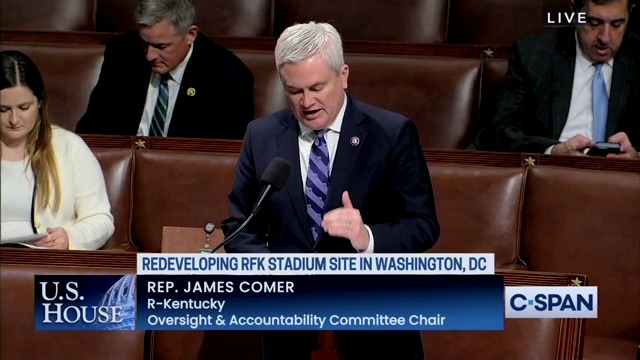Comer Delivers Remarks on House Floor in Support of the D.C. Robert F. Kennedy Memorial Stadium Campus Revitalization Act
WASHINGTON – Today, House Committee on Oversight and Accountability Chairman James Comer (R-Ky.) delivered remarks on the House floor in support of H.R. 4984, the D.C. Robert F. Kennedy Memorial Stadium Campus Revitalization Act. Introduced by Chairman Comer, the bipartisan legislation will repurpose approximately 174 acres of unused federal land in the nation’s capital and provide Washington D.C. the opportunity to revitalize the vacant RFK stadium site. The legislation is set to pave the way for Washington to create meaningful new jobs, add millions in city revenue, and transform the Anacostia River waterfront into a lively destination for residents and visitors.
Below are Chairman Comer’s remarks as prepared for delivery.
Thank you, Mr. Speaker.
I rise in support of H.R. 4984, which repurposes approximately 174 acres of unused federal land in D.C.
Despite its long history and importance to D.C. residents, the Robert F. Kennedy Memorial Stadium campus in Southeast D.C has been abandoned to become unused parking lots, open fields, and a deteriorating stadium that is being demolished.
The site is currently under a lease that requires the land be used for stadium purposes, recreational purposes, or other public purposes—but under current law the site cannot be used for commercial or residential development.
Absent Congressional action, this land in our Nation’s Capital will remain unused with ongoing maintenance costs and environmental liabilities remaining the full responsibility of the National Park Service—an ongoing burden for the American taxpayer.
My bill, H.R. 4984 would change that.
The bill transfers administrative jurisdiction from the National Park Service to D.C. while preserving the Federal government’s ownership of the land.
This allows D.C. to use the land for stadium purposes, commercial and residential development, recreational facilities, open spaces, or additional public purposes.
However, D.C. may not use federal funds for any potential future development of a sports stadium.
The bill enables D.C to transform the unused RFK site into stores, restaurants, office buildings, and apartment complexes.
This economic development will help revitalize the RFK stadium site— creating new jobs and tax revenue for the District’s residents.
Let me be clear—Congress has a constitutional duty to oversee the Nation’s Capital city.
We have diligently exercised this role by holding numerous oversight Hearings in the Oversight Committee this Congress with D.C.’s Major and City Council.
We have also successfully blocked, in bipartisan fashion with the President’s support, the City Council’s ill-advised criminal reform legislation from going into effect last year—the first law of the 118th Congress.
And we will continue looking for legislative opportunities to return order to the District by addressing the rising crime crises, returning federal workers to their offices in the District to contribute to the local economy, and seeking ways to bolster the educational system.
The D.C. Robert F. Kennedy Memorial Stadium Campus Revitalization Act also represents Congress doing its job to oversee the District by authorizing the best utilization of area land to help the City thrive.
We should want this for our Nation’s Capital city—a home to the taxpayer’s federal workforce and a city that hosts millions of American visitors and global tourists each year.
I thank my Committee colleague Congresswoman Eleanor Holmes Norton for working with me to write this smart, bipartisan legislation.
I also want to thank Natural Resources Committee Chairman Westerman and Ranking Member Grijalva, and their staff, for working with my staff to write the improved bill we are considering today.
I urge my colleagues to support this bipartisan bill so that we can help revitalize our Nation’s Capital.
I yield back the balance of my time.
READ MORE:
Comer, Norton Introduce the D.C. Robert F. Kennedy Memorial Stadium Campus Revitalization Act
